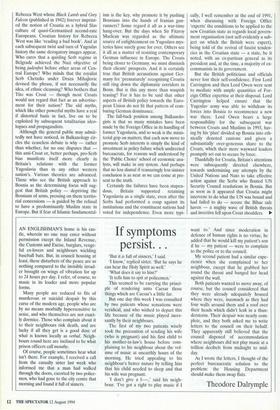If symptoms
persist..
AN ENGLISHMAN'S home is his cas- tle, wherein no one may enter without permission except the Inland Revenue, the Customs and Excise, burglars, venge- ful ex-lovers and neighbours wielding baseball bats. But, in council housing at least, these disturbers of the peace are as nothing compared to the invisible invad- er brought on wings of vibration for up to 24 hours per day. I refer, of course, to music in its louder and more popular forms.
Many people are reduced to fits of murderous or suicidal despair by this curse of the modern age, people who are by no means morbidly hypersensitive to noise, and who themselves are not exact- ly dormice. Those who complain about it to their neighbours risk death, and are lucky if all they get is a good dose of what is known locally as verbal. Neigh- bours round here are inclined to be what prison officers call mouthy.
Of course, people sometimes hear what isn't there. For example, I received a call from the casualty sister last week who informed me that a man had walked through the doors, escorted by two police- men, who had gone to the city centre that morning and found it full of sinners. 'But it is full of sinners,' I said.
'I know,' replied sister. 'But he says he can hear the Holy Spirit as well.'
'What does it say to him?'
'It tells him to spit at policemen.'
This seemed to be carrying the princi- ple of rendering unto Caesar those things which are Caesar's a little far.
But one day this week I was consulted by two patients whose sensations were veridical, and who wished to depart this life because of the music played inces- santly by their neighbours.
The first of my two patients wisely took the precaution of sending his wife (who is pregnant) and his first child to his mother-in-law's house before com- plaining to his neighbour about the vol- ume of music at unearthly hours of the morning. He tried appealing to his neighbour's better nature by telling him that his child needed to sleep and that his wife was pregnant.
'I don't give a f—,' said his neigh- bour. 'I've got a right to play music if I want to.' And since moderation in defence of human rights is no virtue, he added that he would kill my patient's son if he — my patient — were to complain to the police or to the council.
My second patient had a similar expe- rience when she complained to her neighbour, except that he grabbed her round the throat and banged her head against the wall.
Both patients wanted to move away, of course, but the council considered that they were already adequately housed where they were, inasmuch as they had four walls around them and a roof over their heads which didn't leak in a thun- derstorm. Their despair was nearly com- plete, and they both asked me to write letters to the council on their behalf. They apparently still believed that the council disposed of accommodation where neighbours did not play music at a trillion decibels from midnight to mid- day.
As I wrote the letters, I thought of the perfect bureaucratic solution to the problem: the Housing Department should make them swap flats.
Theodore Dalrymple


















































 Previous page
Previous page